 Last week I approached my good friend, Ted Asregadoo, master of the Mix Six (or is it Mix Six Master) about putting together a special mix featuring Peter Gabriel songs and selections from Michael Giacchino’s scores to Lost. The idea was to create a special tribute to the show’s series finale (airing Sunday, 5/23) that was unique from all of the other blogs out there writing their own farewell posts this weekend. Knowing that Ted was a fan of the long running series, we began a conversation about Lost that evolved into what you’ll read below. Neither of us claim to be Lost experts like Jeff Jensen, who writes for Entertainment Weekly or Ryan McGee, at Zap2It. We’re fans, just like all of you and if you feel like adding to our conversation, well that would be outstanding.
Last week I approached my good friend, Ted Asregadoo, master of the Mix Six (or is it Mix Six Master) about putting together a special mix featuring Peter Gabriel songs and selections from Michael Giacchino’s scores to Lost. The idea was to create a special tribute to the show’s series finale (airing Sunday, 5/23) that was unique from all of the other blogs out there writing their own farewell posts this weekend. Knowing that Ted was a fan of the long running series, we began a conversation about Lost that evolved into what you’ll read below. Neither of us claim to be Lost experts like Jeff Jensen, who writes for Entertainment Weekly or Ryan McGee, at Zap2It. We’re fans, just like all of you and if you feel like adding to our conversation, well that would be outstanding.
Why Peter Gabriel, you ask? As I touched on in this week’s Basement Song, Gabriel’s music contains much of the same mysterious beauty that you hear in Michael Giacchino’s score. Just as the show and orchestral music seem to juxtapose primitive sounds with modern instruments, so does much of what Gabriel has created throughout his career. I sent Ted my ideas for the mix and let him run with it. I think you’re going to like it. We didn’t offer individual tracks because, damn it, this is something unique and Ted worked his tail off linking themes in the song titles to what happened in Lost. For those of you having viewing parties, we offer nearly an hour’s worth of music to get you psyched up for the big show. Enjoy!
Our conversation took place between the controversial “Across the Sea” episode (which gave the origin of Jacob and the Man in Black”) and this past Friday (5/21). Here’s what we had to say:
SCOTT: The two of us came to this program at different times. You’ve been a fan since the pilot first aired and I didn’t start watching until the summer after the 4th season.
Ted, what about Lost made you want to watch it in the first place? Do you consider yourself a fanboy, or was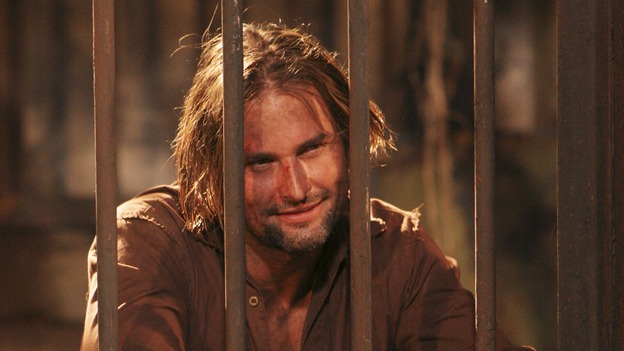 there something else that attracted you to the series. As a follow up, you obviously stuck with it through what some fans call the “lost” episodes, in which the producers felt like they were in a cage along with Sawyer and Kate (season 3). Was there ever a point when you were ready to call it a day and wait for the finale to see how the whole island drama played out?
there something else that attracted you to the series. As a follow up, you obviously stuck with it through what some fans call the “lost” episodes, in which the producers felt like they were in a cage along with Sawyer and Kate (season 3). Was there ever a point when you were ready to call it a day and wait for the finale to see how the whole island drama played out?
TED: I’ve always been attracted to programs that have to do with the paranormal, or take more normal circumstances and weave in a dark underbelly. Lost appeared in 2004 when the post 9/11 culture in the U.S. fretted that the usual anchors we’d grown used to were no longer there. That sense of being unmoored and adrift in a terrain that on the surface looked familiar, but was anything but was reflected in Lost by contrasting the circumstances the survivors of Oceanic Flight 815 as it crash landed on a supposedly deserted island in the middle of the Pacific Ocean. It was clear from the outset that things were not as they seemed on the island, and that the back stories of the main characters served as a compelling contrast to their present situation — with was peppered with weird stuff like smoke monsters, dead people appearing on the island, polar bears, radio signals, and the like.
And to your second question … Well, there were a few episodes when I thought the show had pretty much run out of steam (mostly in season 3). But because of the writers’ strike and the way ABC kept putting the show on a weird schedule made me wonder if ABC was playing some kind of meta joke on the audience. You know, the island is almost impossible for outsiders to find — and so was the show for a few years. All the flashbacks were getting old, but when they did a flash forward, that was a brilliant move that made me more addicted to show.
My questions for you starts with the obvious: what took you so long to get interested in this show? Did it seem too closed to late comers? I used to think that if you tried to watch Lost after the first couple of seasons, you were screwed because there were so many story lines that newer viewers had no clue as to what was happening. So, did you have a tough time playing catch up? Or did you watch the recaps that helped explain the story arc?
And, of course, what did you think of the kinda sorta Cain and Abel story (“Across the Sea”)?
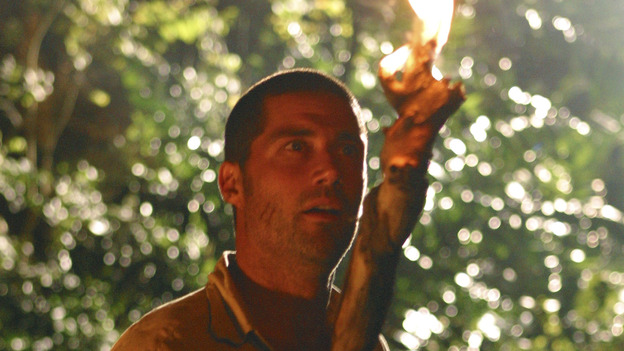 SCOTT: 2004 was pre-TiVo in our house, so everything we wanted to watch had to be recorded on a (gasp) VCR. Thus, we had to be choosy and at that time my wife and I had a select number of shows we were dedicated to that fit into the limited number of hours we watched television. When Lost premiered I recall being interested, however I missed the airing of the pilot (however many times they showed it) and only caught one episode all of first season: a repeat of “White Rabbit,” the episode in which Jack (Matthew Fox) chases the ghost of his father through the jungle and there are flashbacks to the good doctor’s childhood that set up his very long character arc. I really thought the flashback idea was cool, but after that hour, I never went back thinking I would never be able to catch up with the story.
SCOTT: 2004 was pre-TiVo in our house, so everything we wanted to watch had to be recorded on a (gasp) VCR. Thus, we had to be choosy and at that time my wife and I had a select number of shows we were dedicated to that fit into the limited number of hours we watched television. When Lost premiered I recall being interested, however I missed the airing of the pilot (however many times they showed it) and only caught one episode all of first season: a repeat of “White Rabbit,” the episode in which Jack (Matthew Fox) chases the ghost of his father through the jungle and there are flashbacks to the good doctor’s childhood that set up his very long character arc. I really thought the flashback idea was cool, but after that hour, I never went back thinking I would never be able to catch up with the story.
Jump ahead to 2008 and I was writing a post on ABC’s Brothers and Sisters for Popdose. I went to the ABC website to grab some jpegs and noticed that every season (up to season 4) of Lost was available to watch (for free) and apparently in HD. My initial thought was, “how good could this streaming quality really be?” I decided to watch the first hour of Lost just to answer the question and to quell my interest in the pop culture phenomenon of Lost. Three hours later, after viewing the two part pilot and the first episode, I was hooked.
I think you’re right that if you came to the series late it would have been difficult to catch up. If Lost had aired during a different era, it never would have lasted this long. However, in the 21st Century, when DVD box sets are available and you can download episodes from iTunes or go to Hulu or the network website to catch up on nearly 100 hours of television in three months (which I did), then the opportunity has always there to become a fan of the show and join the community of people who have made it last so long. Also helpful is the dense Lost Wiki site, Lostpedia, which offers not only detailed summaries of each episode, but breaks down the various themes and motifs that carry throughout each episode.
To me, Lost is the first great series of the 21st Century. The creators embraced the new technology to make their content/art readily available for their fans on several different mediums (TV, computer and DVD), while also making themselves accessible to their fans through chats and podcasts, plus appearances at conventions like Comic-Con. In their success in telling a grand, sweeping epic story, they have changed the way a television dramas can be made and their story told. Now, that doesn’t mean their techniques will be replicated for a long, long time, but that is just one of the legacies of this series.
As for the “Across the Sea” episode, which told some of the backstory of Jacob and the Man in Black, I have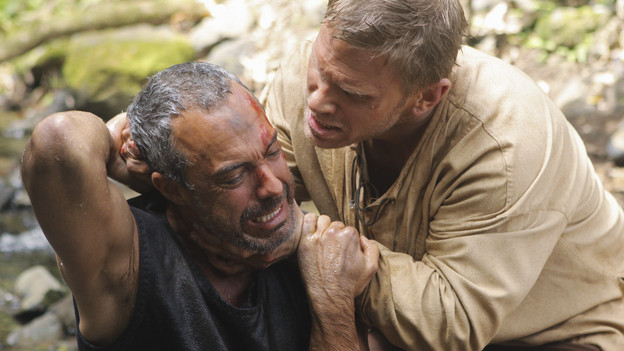 mixed feelings. I think it was a bold thing to do so late in the game to tell this story. I believe that when viewed in context with the entire season (i.e. when it’s available on DVD), the story will make more sense. However, there is a big part of me that was disappointed with the episode. I guess I expected more answers. I hope that they will come.
mixed feelings. I think it was a bold thing to do so late in the game to tell this story. I believe that when viewed in context with the entire season (i.e. when it’s available on DVD), the story will make more sense. However, there is a big part of me that was disappointed with the episode. I guess I expected more answers. I hope that they will come.
TED: When Lost started, one of my friends/neighbor said “Oh, Lost… that’s just The X-Files for dummies.” I thought his comment was funny at first, because with all the stuff the creators of the series were throwing at us, it seemed like they were just seeing what stuck to the wall without really explaining the hows and the whys certain things happened on the island.
I’m not sure if this is just myth (or sour grapes) but one of the producers on the first season (who later quit the series) said they had absolutely no idea where the series was going, and figured ABC would cancel it after the first season, so they just decided to go for it and come up with the weirdest stuff they could. Sometimes the first season really feels like that, but after the series caught fire, it was clear the writers had to go back and take all those crazy ideas and make some sense out of them.
 To me, what makes Lost unique in the genre is that it really humanizes the characters before interjecting the paranormal stuff. I mean, it took a bit of time, but the actors brought such depth to the characters that, for me, I really cared about them. With wannabe Lost series like Happy Town I really don’t care about the characters because they all seem like “Twin Peaks” imitations; they have very little depth from the get go and the whole thing seems too contrived to be compelling. To borrow a David Lynch phrase, Lost created a “mood” that felt unique in prime time TV. I don’t get that from V or Happy Town.
To me, what makes Lost unique in the genre is that it really humanizes the characters before interjecting the paranormal stuff. I mean, it took a bit of time, but the actors brought such depth to the characters that, for me, I really cared about them. With wannabe Lost series like Happy Town I really don’t care about the characters because they all seem like “Twin Peaks” imitations; they have very little depth from the get go and the whole thing seems too contrived to be compelling. To borrow a David Lynch phrase, Lost created a “mood” that felt unique in prime time TV. I don’t get that from V or Happy Town.
SCOTT: Exactly. Lost has always been about the characters. I think that the flashbacks (and forwards and sideways) really gave viewers characters to care about and by caring about these people, it made the crazy shit happening to them a little easier to accept. Perhaps that’s one reason some viewers had a problem with the “Across the Sea” episode that focused entirely on Jacob and the Man in Black. We don’t know these guys save for a couple of episodes and now we’re supposed to care about their back story… with only four episodes left? And they came upon a pool of light? We care because? Yet, because we’ve known Jack and Kate and Sawyer and Hurley for so long, whatever is thrown at them we believe.
It’s ironic that your friend called the show The X-Files for dummies because that show petered out and never gave us a satisfying ending. I have never seen the show as The X-Files but rather as one continuous episode of The Twilight Zone. That classic series used fantasy and science fiction as a means of dealing with relevant social issues, much in the same way Lost has posed some deep, philosophical issues to viewers over the chorus of six seasons. Fate vs. Freewill? You don’t get that very often on CSI or Grey’s Anatomy. Likewise the deep themes of spirituality and redemption.
I agree that the first season did have some of that “let’s see what we can get away with” mentality, but I don’t believe that story about the producers thinking the show would be canceled after the first season. It had great ratings during season one. I have read many times that executive producers Damon Lindelof and Carlton Cuse have ha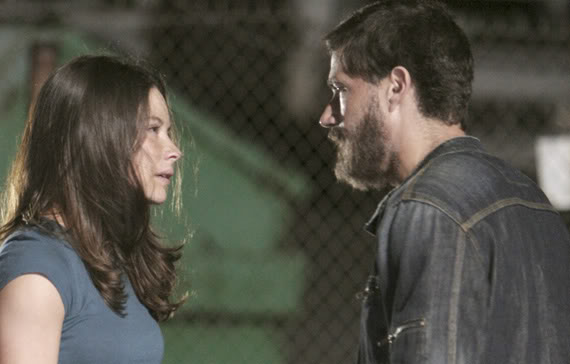 d a vision of how the show would end (the last four scenes, in fact) since the end of season one. Getting to that end became a challenge, especially in season three. However, after they made their deal with ABC to end the series with a specific number of episodes (this all happened in the middle of season 3), the writing and the show became very focused. It was at the end of season that the flash forward occurred, completely changing the direction of the series. Man, was that a brilliant move, or what?!
d a vision of how the show would end (the last four scenes, in fact) since the end of season one. Getting to that end became a challenge, especially in season three. However, after they made their deal with ABC to end the series with a specific number of episodes (this all happened in the middle of season 3), the writing and the show became very focused. It was at the end of season that the flash forward occurred, completely changing the direction of the series. Man, was that a brilliant move, or what?!
TED: Speaking of religious themes reminds me of the episode when Jack convinces Sawyer, Juliet and others to detonate the Hydrogen bomb at the bottom of that shaft the Dharma group was drilling out. Jack, a man of science who doesn’t have any of John Locke’s belief that they are on the island for a reason, asks everyone to take a leap of faith and trust him that if the bomb goes off, they will be thrown back into the present and won’t be trapped in the ’70s. When it appears the leap of faith didn’t work (the bomb not going off, Juliet getting pulled down into the shaft when the magnetic field started to suck in all metal from the surrounding area, and Juliet triggering the explosion resulting in her death), Sawyer’s fragile belief in Jack’s entreaties that all will be right again evaporates into rage at the loss of his love. And for the first time in a long time Jack looks utterly helpless and, excuse the word choice here, lost. Science has seemingly failed him, and his move toward “everything happens for a reason” belief system also comes at a cost. It took him quite a few episodes to recover from that, but now that he’s been shown that they were indeed brought to the island for a reason, his more scientific mind is trying to put together the clues as to why they are there — which, of course, will be revealed very very soon.
SCOTT: The show has been bold in its dealings with spirituality. Take Sayid, for example. When we first met him on the island he was a religious man who prayed each day. He was constantly seeking atonement for his sins. Indeed, he left the castaways in the first season to go find himself after he tortured Sawyer (that whole incident over Shannon’s asthma inhaler). In Sayid, I felt that they really tried to show a man who was torn between his religion and what his function in life had become. That always fascinated me.Then there was Desmond, who attempted to be a monk. Charlie, who was very religious before Driveshaft took off. And of course, there was Mr. Eko and the church he was building.
I’ve read in a couple articles that this 6th season was when the producers let it be known once and for all that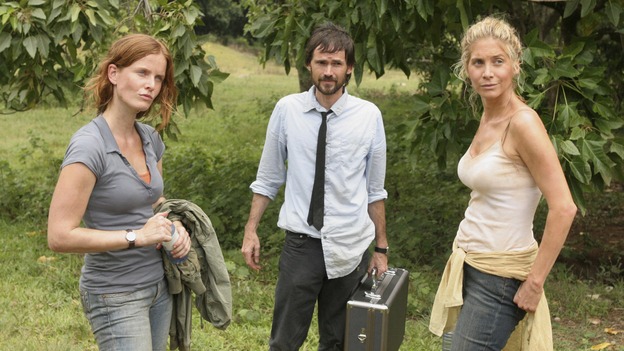 their show was a spiritual program. I don’t think they needed to clarify that to any of their long time viewers. Anyone who watched Locke’s struggle to do everything the island told him to do, and then try to be the leader of the Others because that’s what Jacob wanted, you saw a man whose life resembled Job. So many horrible things happened to this guy, and yet he kept coming back to his belief that he had a purpose, that the island had a purpose for him. Then there is Jack, who began as a man of reason but once he left the island, he slowly evolved (as you said) into a man of faith. These are controversial themes for network television, which tends to stay away from faith for fear of offending people.
their show was a spiritual program. I don’t think they needed to clarify that to any of their long time viewers. Anyone who watched Locke’s struggle to do everything the island told him to do, and then try to be the leader of the Others because that’s what Jacob wanted, you saw a man whose life resembled Job. So many horrible things happened to this guy, and yet he kept coming back to his belief that he had a purpose, that the island had a purpose for him. Then there is Jack, who began as a man of reason but once he left the island, he slowly evolved (as you said) into a man of faith. These are controversial themes for network television, which tends to stay away from faith for fear of offending people.
TED: Call it a tension between modernity and spirituality, but it’s clear that one of the major thematic arcs on Lost is an exploration of that tension. The title of the series alone is pretty pregnant with meaning. Taken in the literal sense, yes this show is about the survivors of a plane crash that are lost on a uncharted island somewhere between Australia and North America. But with all the flashbacks and flash forwards, it’s clear these characters are lost in other ways. Jack’s identity as a man of science, the good son to his reckless dad, and later as a father who is unwittingly demanding on his own son — to the point where his son has to keep his talent for music hidden from him– are all tested when he becomes the de facto leader of the castaways on the island. It is through his evolution as a leader that he eventually starts to believe that all the events that led up to being on the island did indeed happen for a reason. One thing that Jack is still lost in is his ability to love someone. His relationship with Kate and Juliet demonstrated that Jack has a wall that he will not let down, and that is he cannot fully give himself to another person. That may be because of this upbringing (i.e., having a father who was a perfectionist), but I’m sure we will see what eventually happens to his character’s development.
Except for Desmond, Sayid is probably the one character tortured by love. He knows he has evil inside him, 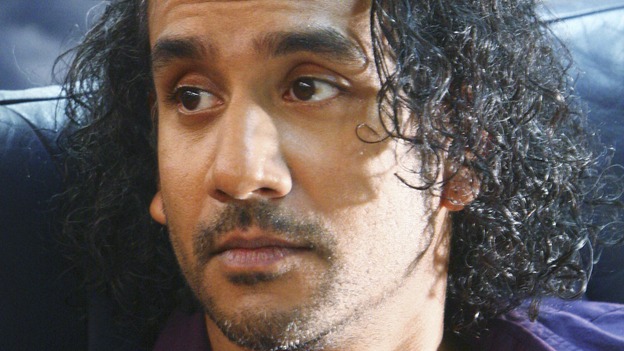 and he’s more than willing to use it — sometimes for nefarious ends, sometimes for revenge, and sometimes as a sacrifice for others. He’s a complex character, but there was something about the plane crash and the relationships he formed with his fellow castaways that made him want to do more good in the world than bad. Unfortunately, when it was revealed that he was in the Iraqi Revolutionary Guard and used to torture people for information, his services were needed at various points in the series to help those he was most loyal to (i.e., Jack) to get information, help save them from attack, or carry out some kind of violence — so those he cared about would be safe from harm. His sacrifice to his friends in the submarine (i.e., taking the explosive to the farthest point of the sub so there would be a chance that his friends would survive) was both an act of love, and a way to break free from what was supposedly his destiny (i.e., a person consumed by evil).
and he’s more than willing to use it — sometimes for nefarious ends, sometimes for revenge, and sometimes as a sacrifice for others. He’s a complex character, but there was something about the plane crash and the relationships he formed with his fellow castaways that made him want to do more good in the world than bad. Unfortunately, when it was revealed that he was in the Iraqi Revolutionary Guard and used to torture people for information, his services were needed at various points in the series to help those he was most loyal to (i.e., Jack) to get information, help save them from attack, or carry out some kind of violence — so those he cared about would be safe from harm. His sacrifice to his friends in the submarine (i.e., taking the explosive to the farthest point of the sub so there would be a chance that his friends would survive) was both an act of love, and a way to break free from what was supposedly his destiny (i.e., a person consumed by evil).
Taking Jack and Sayid as products of modernity (i.e., medical science and a military dictatorship using state of the art technology for power and control), the producers have built in a critique of modernity and being spiritually trapped without being too preachy about it – which is not an easy thing to do in a series that has so many cast members.
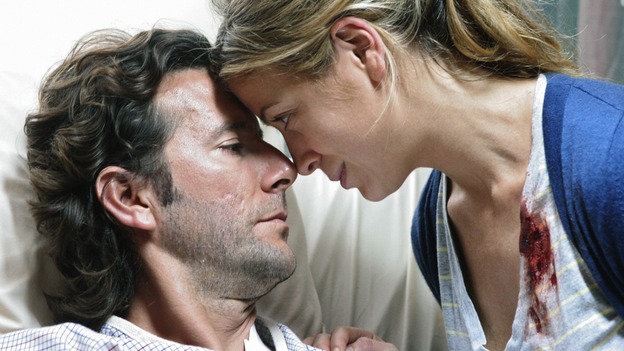 SCOTT: Speaking of having so many cast members, there is one aspect of this show, as an ensemble series, that I don’t think it gets nearly enough credit for and that’s the way they managed the storylines of their vast cast. Save for season premieres, or those episodes set aside to ramp up for the season finales, each week on Lost was dedicated to one character and his/her flashback/forward or sideways story. Unlike so many ensemble shows that feel an obligation to provide a plot each week for each of their characters (Grey’s Anatomy is very guilty of this), Lost focused on one or two people a week, allowing us viewers the chance to get to know the characters. We weren’t bombarded with ten plots at once. Some weeks (especially when the castaways began to splinter) you didn’t see certain characters at all, but you didn’t miss them.
SCOTT: Speaking of having so many cast members, there is one aspect of this show, as an ensemble series, that I don’t think it gets nearly enough credit for and that’s the way they managed the storylines of their vast cast. Save for season premieres, or those episodes set aside to ramp up for the season finales, each week on Lost was dedicated to one character and his/her flashback/forward or sideways story. Unlike so many ensemble shows that feel an obligation to provide a plot each week for each of their characters (Grey’s Anatomy is very guilty of this), Lost focused on one or two people a week, allowing us viewers the chance to get to know the characters. We weren’t bombarded with ten plots at once. Some weeks (especially when the castaways began to splinter) you didn’t see certain characters at all, but you didn’t miss them.
The series never would have lasted if they had tried to focus on all of the characters at once, week in and week out. The viewers wouldn’t have been able to focus on what was going on. The producers had the foresight, after that incredible pilot episode, to slow things down and gradually introduce us to each character, as well as the mysteries of the island. I believe that because we got to know the characters first, and then the mysteries, we came to accept the insane things taking place.
Too often, in our ADD culture, television shows feel compelled to keep things coming at you at a rapid pace for fear that the channel may be changed. Lost never succumbed to this line of thinking. They were never afraid to slow things down for the sake of the show. There are very few shows, especially ensemble dramas, that have the courage to tell their stories this way. Mad Men, Southland and Friday Night Lights immediately come to mind as these type of ensemble shows.
Of course, the characters on paper may not be what turns up on screen. Lost was blessed with a profoundly brilliant cast, each who inhabited their roles with such depth that it will be so difficult not seeing these people on television each week. Even the guest stars were perfectly cast (save for Bai Ling). Thank God for the DVD’s. Now I can revisit Lost whenever I want, much like I can revisit one of my favorite books.
I want to make sure we touch on one of Lost‘s secret weapons and that is the score by Michael Giacchino (who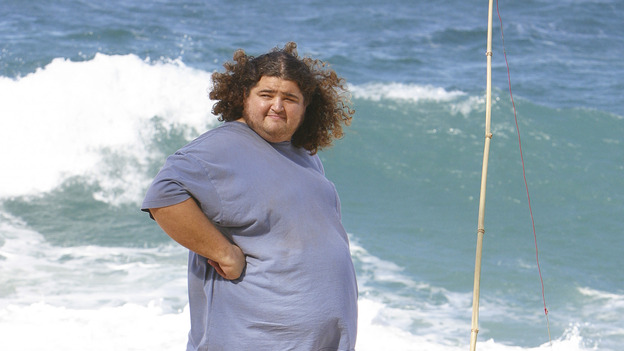 won the Academy Award this year for Up). Unlike so many series in which there are a series of music cues that are reused ad nauseum, Giacchino watches and writes music for every scene in the show. Moreover, the score is performed by an actual orchestra and not on synthesizer, giving the music a cinematic touch that is rare on TV. Giacchino, who was largely unknown until J.J. Abrams asked him to do the music for Alias, has crafted art that will stand on its own long after the last episode of Lost has aired. His music has covered every genre (just like the series), many times mysterious, often exciting and foreboding, and always beautiful. One can’t hear the quiet piano movements that he’s composed without thinking of Jack and Kate falling in love, the deaths of beloved characters like Charlie, Jin and Sun, or the anguish Locke has gone through on his tragic journey.
won the Academy Award this year for Up). Unlike so many series in which there are a series of music cues that are reused ad nauseum, Giacchino watches and writes music for every scene in the show. Moreover, the score is performed by an actual orchestra and not on synthesizer, giving the music a cinematic touch that is rare on TV. Giacchino, who was largely unknown until J.J. Abrams asked him to do the music for Alias, has crafted art that will stand on its own long after the last episode of Lost has aired. His music has covered every genre (just like the series), many times mysterious, often exciting and foreboding, and always beautiful. One can’t hear the quiet piano movements that he’s composed without thinking of Jack and Kate falling in love, the deaths of beloved characters like Charlie, Jin and Sun, or the anguish Locke has gone through on his tragic journey.
Giacchino’s score to this series stands up with the work of his idols like Bernard Hermann and John Williams. Just as you can’t think of North by Northwest and Vertigo without Hermann’s music, or Star Wars and Raiders of the Lost Ark without Williams’, you can not think of Lost without Giacchino. When composers looking back on the early part of this century think of music that defined television and cinema, I believe they will recall what Howard Shore did for the Lord of the Rings trilogy and what Giacchino did for Lost.
TED: I agree that Giacchino’s music for the show is quite strong, but sometimes it’s a bit too treacly for me. Case in point, the episode when Sayid, Jin, and Sun died in the submarine. The shot of Sun and Jin’s lifeless bodies reaching out for each other was a bit too much for me. Perhaps it was more how the shot lingered that miffed me, and how the whole sequence was presented that seemed to be forcing the emotions out of the viewer.
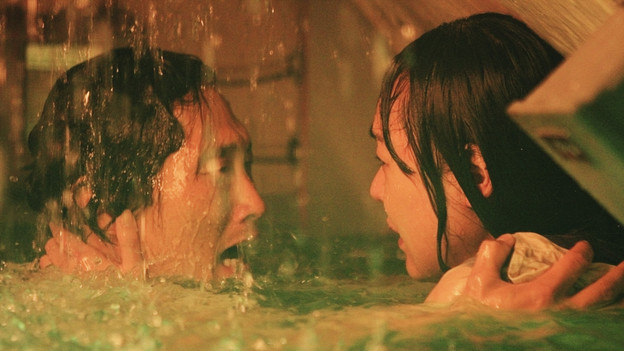 But these are minor quibbles compared to how effective I thought Giacchino compositions for Lost were. One other thing we’ve haven’t touched on is the opening theme J.J. Abrams composed for the series. I don’t think I have ever heard a “theme” that really reflected the tenor of the show in a way that’s so, well, dissonant. I don’t know about you, but have you ever heard a main title sequence for a TV show that was so unmusical, yet so wonderfully fit the mood of a show?
But these are minor quibbles compared to how effective I thought Giacchino compositions for Lost were. One other thing we’ve haven’t touched on is the opening theme J.J. Abrams composed for the series. I don’t think I have ever heard a “theme” that really reflected the tenor of the show in a way that’s so, well, dissonant. I don’t know about you, but have you ever heard a main title sequence for a TV show that was so unmusical, yet so wonderfully fit the mood of a show?
SCOTT: I’m going to have to disagree with you about the Jin and Sun death scene. I felt that it was a touching ending to two characters that were separated for so long and decided to die together. Giacchino’s music really brought me to tears in that moment. I don’t think it was manipulative in any way, as this is the end of the series and we were all saying good bye to two beloved characters. Perhaps that’s just me.I agree that the theme song is one of the most distinct to my memory. Coupled with the turning image of the show title, you get everything you need to know about what Lost‘s mood in that short sequence.
Now that the penultimate episode has aired, what do you expect going into the finale? I know from reading interviews that all of the answers aren’t going to be given. To be quite honest, I’m most excited to see what these final 4 scenes that Cuse and Lindelof have been planning turn out to be. From a creative standpoint, this fascinates me because I’ll eventually go back to look for clues that lead up to the ending. I hope that somehow, John Locke’s sacrifice comes into play in the island story. He is/was such a wonderful character 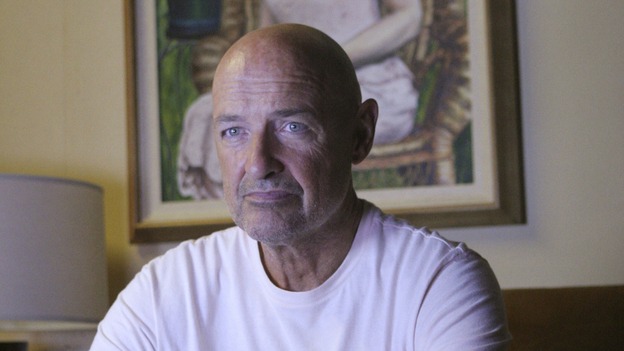 and I feel a little like he got cheated.
and I feel a little like he got cheated.
Since Jack has already accepted his role as guardian, I don’t have any idea what’s going to happen in the last episode. Somehow the sideways world and island world are going to converge. How? I don’t know. I assume that the Man in Black will be defeated. Then again, this being Lost, there are no guarantees.
TED: It’s tough to know what to expect of the finale. I have purposefully stayed clear of any fan forums, websites, and even newspaper articles on Lost because I enjoy the show when I let it wash over me without any spoilers, preconceptions, or speculations on where the show is going. That might make me more of a casual fan who can stay away from the game of “What’s going to happen next” but so be it.
Regarding your question on Jack: I have to say that it doesn’t surprise me that Jack has taken on the role of guardian. His leadership position among the castaways and his inability to fully give himself to another make him a prime candidate for this new role. He cares about his friends, and it seems to me that volunteering to be a guardian is a way of showing love for those he’s grown close to. Of course, the tension between Locke and Jack (even though it’s really the smoke monster who now resembles Locke) has to get resolved through when these archetypes of “Good” and “Evil” battle each other in ways that I can’t even being to imagine.
I have to say, though, that this series has been quite a ride. It hasn’t been “X-Files for dummies” as my friend asserted. Rather, it’s been a series that has captured the anxieties and yearnings of a segment of the culture who themselves feel lost at times, but are also fascinated by the “slow reveal” of a grand plan that suggests a new moral paradigm that is by design and not random chance. In a way, Lost has a connection with the film, The Matrix. But instead of Plato’s Republic with kung-fu as back drop, Lost takes spirituality vs science, destiny vs random chance, morality vs amorality, and a whole host of other opposites and lets them play out against a video game-like environment of survival on an uncharted island where paranormal things happen to survivors of a plane crash; survivors who also have intriguing back stories.
asserted. Rather, it’s been a series that has captured the anxieties and yearnings of a segment of the culture who themselves feel lost at times, but are also fascinated by the “slow reveal” of a grand plan that suggests a new moral paradigm that is by design and not random chance. In a way, Lost has a connection with the film, The Matrix. But instead of Plato’s Republic with kung-fu as back drop, Lost takes spirituality vs science, destiny vs random chance, morality vs amorality, and a whole host of other opposites and lets them play out against a video game-like environment of survival on an uncharted island where paranormal things happen to survivors of a plane crash; survivors who also have intriguing back stories.
I’ll miss seeing this show every week, but I’m thrilled ABC is sending it off in such a grand fashion. The network that canceled some beloved series before they were able to complete their stories (Twin Peaks and thirtysomething come to mind) has redeemed itself in my estimation. I just hope that ABC will take chances on more imaginative shows in the future.
SCOTT: I think that ABC and the other networks will continue to take some risks, however it’s the execution of these shows that will determine whether these shows will last or not. That’s where Lost rose above the other genre shows that came on in the wake of Lost’s success (shows like Heroes, Jericho and The Nine). Those shows all started out with a bang, yet they couldn’t keep up the quality that Lost delivered week in and week out, even during it’s weaker episodes. To ABC’s credit, they pretty much let Cuse and Lindelof produce the show that they wanted with little interference. I mean, they ended season four by making the island disappear and then spent a portion of season five dealing with time travel! It doesn’t get any riskier (or trippier) than that! This radical storytelling didn’t happen on HBO or basic cable, it happened on network prime time television!
 As much as I’ll miss seeing the show each week, I’ll also miss the weekly discussions I had with a group of fellow Lost devotees that took place the morning after each new episode. It’s sort of like graduation: we’ll all move on, but there will always be the good memories. I’m actually getting together with my Lost discussion group to watch the finale with them. Isn’t that crazy? Who would have imagined all of the viewing parties taking place around the world to watch the last couple hours or a television series? As I told a friend who’s never watched Lost, Sunday night is like the Super Bowl. You have the two hour pregame show from 7-9 PM in the form of the retrospective, then you have the big game from 9-11:30 PM, and finally there is the post game analysis on Jimmy Kimmel at 12:00 AM. I’m excited. Do I expect all of the mysteries answered? No. But as long as it’s a hard fought game, with the margin of victory a touchdown or less, then I think all Lost fans will be satisfied.
As much as I’ll miss seeing the show each week, I’ll also miss the weekly discussions I had with a group of fellow Lost devotees that took place the morning after each new episode. It’s sort of like graduation: we’ll all move on, but there will always be the good memories. I’m actually getting together with my Lost discussion group to watch the finale with them. Isn’t that crazy? Who would have imagined all of the viewing parties taking place around the world to watch the last couple hours or a television series? As I told a friend who’s never watched Lost, Sunday night is like the Super Bowl. You have the two hour pregame show from 7-9 PM in the form of the retrospective, then you have the big game from 9-11:30 PM, and finally there is the post game analysis on Jimmy Kimmel at 12:00 AM. I’m excited. Do I expect all of the mysteries answered? No. But as long as it’s a hard fought game, with the margin of victory a touchdown or less, then I think all Lost fans will be satisfied.
So there you have it. Hope you enjoyed some of our insight and please, feel free to offer your own opinions below.
Here’s the list of songs from Ted’s mix:




Comments